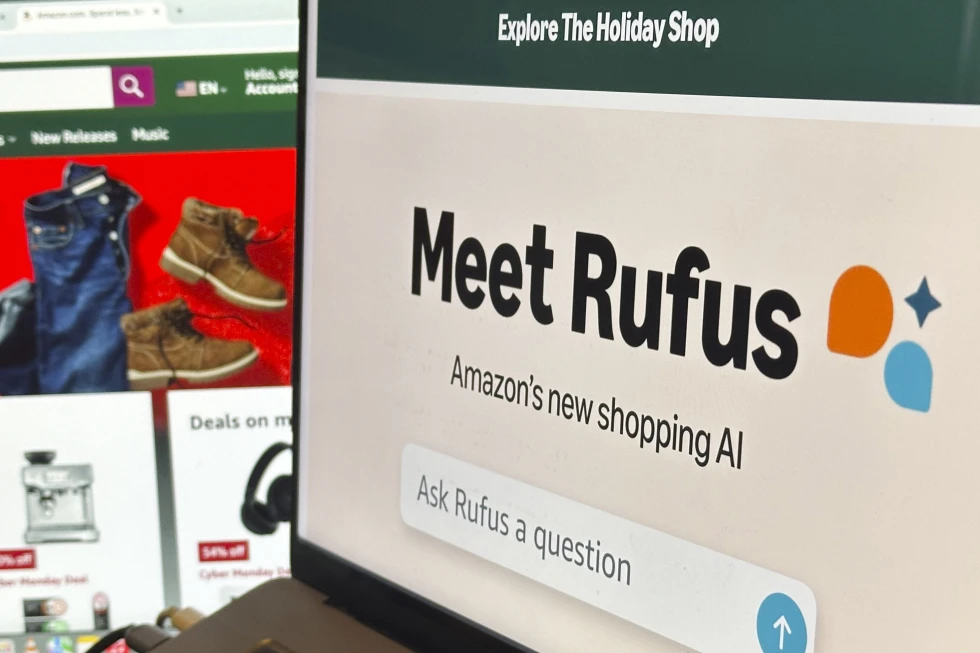Feeling overwhelmed by the task of choosing gifts this year? While AI chatbots can offer assistance, don’t rely on them for complete solutions or expect them to always provide perfect answers.
Anyone looking for Cyber Monday deals will likely come across newer, more conversational versions of chatbots designed by retailers and e-commerce sites to enhance customer service.
Some companies have upgraded their chatbots with advanced generative AI, allowing shoppers to ask more natural questions like, “What’s the best wireless speaker?”
Retailers hope shoppers will use these chatbots, often called shopping assistants, as virtual helpers to find or compare products. Earlier versions of chatbots were mainly focused on specific tasks, like tracking orders or processing returns.
Amazon, a leader in online retail, has introduced Rufus, an AI-powered shopping assistant this year. Shoppers have been using it to ask about details like how easy a specific coffee maker is to clean, or what games it recommends for a child’s birthday party. Rufus is available for U.S. holiday shoppers and in some other countries. It’s not the only AI shopping assistant; Walmart is also testing a similar chatbot for a limited number of categories, such as toys and electronics.
Perplexity AI added a new feature to its AI-powered search engine last month, enabling users to ask questions like “What’s the best women’s leather boots?” and get product suggestions that are not sponsored. Mike Mallazzo, an analyst at Future Commerce, noted its rapid adoption.
Interest in AI chatbots from retailers grew after ChatGPT, developed by OpenAI, became widely popular in late 2022, highlighting the potential of generative AI technology. Brands like Victoria’s Secret, IKEA, Instacart, and Ssense are also experimenting with these advanced chatbots, some powered by OpenAI.
Before the rise of these new AI chatbots, online retailers already used customer data, like past purchases or search history, to generate product recommendations. Amazon was among the pioneers of this approach, so Rufus’ recommendation features aren’t entirely groundbreaking.
However, Rajiv Mehta, Amazon’s VP of search and conversational shopping, explained that Rufus now offers more helpful recommendations by asking follow-up or clarifying questions. Customers also use Rufus to find personalized deals.
That said, these chatbots are still prone to errors. Juozas Kaziukenas, founder of Marketplace Pulse, tested Rufus by asking for gaming TV recommendations, but the response included products that weren’t actually TVs, and the suggested “cheapest” options weren’t the lowest-priced either.
An AP reporter asked Rufus for gift suggestions for a brother, and the chatbot offered ideas like a T-shirt, keychain with charms, or a multifunctional knife engraved with “BEST BROTHER EVER.” After further conversation, Rufus suggested a few Barcelona soccer jerseys, but didn’t provide price comparisons.
“Rufus is constantly learning,” said Mehta, highlighting that the system is still improving.
Shop AI, a chatbot launched by Shopify in Canada last year, also aims to help users discover new products by asking questions about gift recipients or desired features. However, it struggles with recommending specific products or identifying the lowest-priced options.
These limitations show that AI chatbots still have a long way to go before they can fully meet the expectations of both retailers and consumers.
For shopping assistants to truly transform the experience, they’ll need to be deeply personalized and able to independently remember customer preferences, purchase history, and habits, according to McKinsey & Company.
Amazon notes that Rufus bases its responses on product listings, customer reviews, and community Q&As, which may include fake reviews designed to boost or diminish product sales. The AI model behind Rufus has also been trained on Amazon’s entire catalog and some public web data.
However, it’s unclear how exactly these AI systems weigh different components of training data, like reviews, in shaping their recommendations. Nicole Greene, an analyst at Gartner, pointed out that it’s not clear how these assistants generate product suggestions.
Perplexity AI’s new shopping feature allows users to ask for products like “best phone case,” with results drawn from multiple sources, including Amazon and Best Buy. Perplexity encourages retailers to share data about their products to improve the chances of being recommended.
Perplexity’s CEO Aravind Srinivas admitted he was unsure about how exactly the new feature determines product recommendations, though Dmitry Shevelenko, Perplexity’s Chief Business Officer, clarified that the nature of generative AI means the outputs can’t be predicted in advance. Shevelenko emphasized that retailers can’t manipulate the system with keyword tricks – only better products and features will lead to recommendations.
